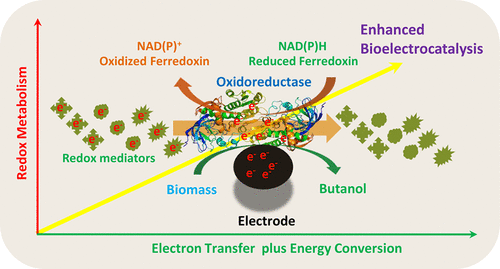当前位置:
X-MOL 学术
›
ACS Energy Lett.
›
论文详情
Our official English website, www.x-mol.net, welcomes your
feedback! (Note: you will need to create a separate account there.)
Enhancement of Butanol Production: From Biocatalysis to Bioelectrocatalysis
ACS Energy Letters ( IF 19.3 ) Pub Date : 2020-02-20 , DOI: 10.1021/acsenergylett.9b02596 Xiaobo Liu 1 , Xiaobin Yu 2
ACS Energy Letters ( IF 19.3 ) Pub Date : 2020-02-20 , DOI: 10.1021/acsenergylett.9b02596 Xiaobo Liu 1 , Xiaobin Yu 2
Affiliation

|
Butanol from renewable biomass is a promising advanced biofuel that can be used as an optimal substitute for gasoline in the transportation sectors, and therefore, large-scale industrial production of biobutanol has great importance to the development of sustainable energy. However, the low bioproductivity of butanol is a big challenge, despite great progress in metabolic engineering and bioprocessing. More importantly, butanol biosynthesis is mainly a consequence of anaerobic transformations catalyzed by specific oxidoreductases and driven by the reducing power; thus, both redox metabolism and electron transfer determine the efficiency of butanol bioconversion. In this Perspective, we highlight the significance of redox balance and electron transfer or energy conversion as a foundation to propose a strategy toward high butanol production from biocatalysis to bioelectrocatalysis. Potential challenges and future directions in the upcoming years are discussed from a bioelectrochemical perspective.
中文翻译:

丁醇生产的增强:从生物催化到生物电催化
来自可再生生物质的丁醇是一种有前途的高级生物燃料,可以用作交通运输行业中汽油的最佳替代品,因此,大规模工业生产生物丁醇对可持续能源的发展至关重要。然而,尽管在代谢工程和生物加工方面取得了巨大进步,但是丁醇的低生物生产力仍然是一个巨大的挑战。更重要的是,丁醇的生物合成主要是特定氧化还原酶催化并由还原力驱动的厌氧转化的结果。因此,氧化还原代谢和电子转移都决定了丁醇生物转化的效率。从这个角度来看,我们强调氧化还原平衡和电子转移或能量转换的重要性,以此作为提出从生物催化到生物电催化实现高丁醇生产的战略的基础。从生物电化学的角度讨论了未来几年的潜在挑战和未来方向。
更新日期:2020-02-21
中文翻译:

丁醇生产的增强:从生物催化到生物电催化
来自可再生生物质的丁醇是一种有前途的高级生物燃料,可以用作交通运输行业中汽油的最佳替代品,因此,大规模工业生产生物丁醇对可持续能源的发展至关重要。然而,尽管在代谢工程和生物加工方面取得了巨大进步,但是丁醇的低生物生产力仍然是一个巨大的挑战。更重要的是,丁醇的生物合成主要是特定氧化还原酶催化并由还原力驱动的厌氧转化的结果。因此,氧化还原代谢和电子转移都决定了丁醇生物转化的效率。从这个角度来看,我们强调氧化还原平衡和电子转移或能量转换的重要性,以此作为提出从生物催化到生物电催化实现高丁醇生产的战略的基础。从生物电化学的角度讨论了未来几年的潜在挑战和未来方向。











































 京公网安备 11010802027423号
京公网安备 11010802027423号